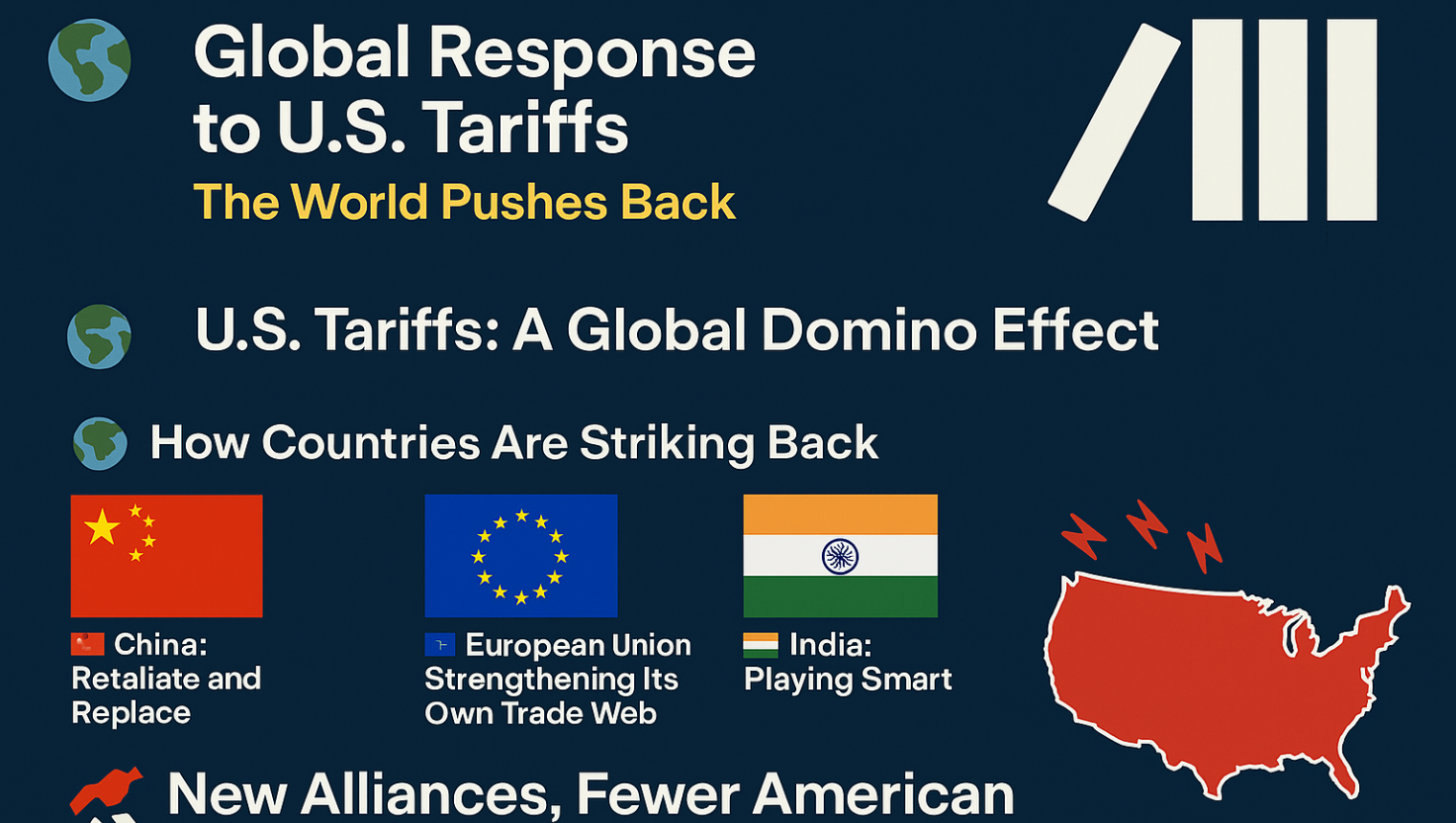Global Reaction to U.S. Tariffs: The World Pushes Back
When the United States pulled the tariff trigger, it wasn't only aiming at imports — it was firing a shot that echoed around the world. But instead of caving in to pressure, the world retaliated. Hard.
From Europe to Asia, the international community has responded swiftly, strategically, and in a number of cases, surprisingly well — leaving America more alone and economically battered than it ever envisioned.
🇺🇸 U.S. Tariffs: A Global Domino Effect
The concept was straightforward: levies to defend American industries and jobs.
The outcome? An entangled complex of trade wars, economic vengeance, and fractured alliances.
📉 Global trade fell by 5.6% in 2024, and U.S. exports alone declined by 12%, says the Peterson Institute for International Economics.
The irony? American businesses are paying higher prices for raw materials, losing access to markets, and seeing supply chains disarray in slow motion.
🌍 How Countries Are Fighting Back
🇨🇳 China: Retaliate and Replace
China didn't just slap back with its own tariffs — it redirected its trade entirely.
🌱 In 2024, China boosted soybean imports from Brazil by 42%, skirting U.S. farmers nearly completely.
At the same time, it's inked big deals with Russia, Southeast Asia, and even the EU, establishing new economic blocs and constricting the noose around U.S. power in Asia-Pacific.
🇪🇺 European Union: Building Its Own Trade Web
Europe didn't wait. The EU seized the tariff challenge and made it a springboard for opportunity:
Accelerated trade agreements with Australia, Japan, and Latin America.
Offered more subsidies to domestic producers to match U.S. prices.
Made several complaints to the World Trade Organization (WTO) against Washington.
💬 "We will not accept being collateral damage in a U.S.-China trade war," said Germany's Economy Minister.
🇮🇳 India: Playing Smart
India, seeing the trade chaos, has moved quickly to fill the gaps. It's expanded exports in textiles, electronics, and chemicals — sectors once dominated by U.S. suppliers.
📈 India's exports to Europe and Asia rose by 17% in 2024, the Commerce Ministry reported.
India also imposed retaliatory tariffs on U.S. products like almonds, apples, and motorcycles — all while increasing trade ties with China and Russia.
🤝 New Alliances, Fewer American Deals
America previously dominated the orchestra of global trade. Today, it is listening from the balcony as others strike the note.
📦 Alternative Trade Blocs on the Rise:
RCEP (Regional Comprehensive Economic Partnership) minus the U.S., now reaches 30% of world GDP.
BRICS+ enlargement — key economies such as Brazil, Russia, India, China, South Africa, and new members creating a significant anti-dollar block.
CPTPP (Comprehensive and Progressive Agreement for Trans-Pacific Partnership) — what used to be a U.S.-initiated idea, now entirely operational without America.
💬 "The U.S. is on the sidelines of the biggest trade deals of the decade," says Brookings Institution analyst.
🏭 American Companies Are Feeling It Too
Apple to Harley-Davidson, U.S. businesses are caught in the crossfire of tariffs:
Some have relocated manufacturing to Vietnam, Mexico, and India.
Others are scaling back with lost overseas customers.
Global brands shun U.S. suppliers owing to uncertainty.
💬 "Tariffs are just another tax — a tax on global trust," a senior U.S. CEO told CNBC anonymously.
📉 The Reputation Cost
American credibility as a trade partner has suffered grievously. Allies doubt America's long-term commitment, while rivals exploit the instability to secure geopolitical advantage.
📉 Foreign investment in the U.S. fell 21% in 2024, UNCTAD reports.
Even nations formerly heavily connected to the U.S. economy are diversifying trade channels, lowering reliance on American products and dollars.
🔚 Conclusion: A Self-Made Trade Trap
The world's reaction to U.S. tariffs demonstrates one thing: the world won't wait for America to lead. And it won't hesitate to push back when trade becomes a weapon.
In attempting to emerge victorious in a trade war, the U.S. has instead forged a global coalition of rivals. The end result is a diminished hand in world economics, a tense domestic economy, and a lengthy roster of allies turned doubters.
💡 Lesson Learned? In a connected world, you don't get ahead by bringing others down — you get ahead by lifting as one.

